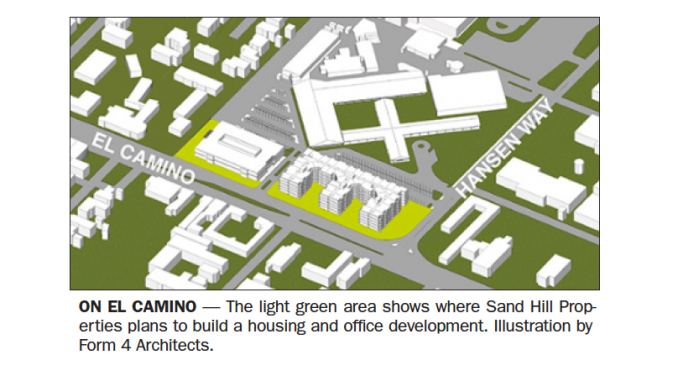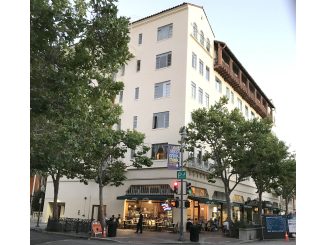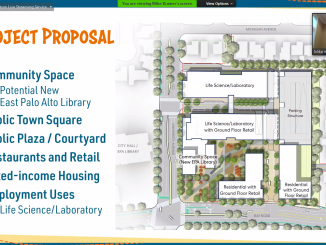
BY SARA TABIN
Daily Post Staff Writer
A dozen Palo Alto residents spoke Monday night in support of a two-story office building and five-story residential building at 3300 El Camino that will bring 187 units of housing to the city. City council members were mixed in their assessment of the project, but a majority seemed to support it.
The project is being proposed by Peter Pau’s Sand Hill Property Co., a developer that’s locked in a court battle with the city over the requirement for a grocery store at Edgewood Shopping Center.
The project site is on the west side of El Camino and just south of Hansen Way. The plan came to council tonight for a “pre-screening” where council members shared feedback to help the developer improve their application.
Without the residential space, the office building meets city codes according to Planning Director Jonathan Lait. That means council can’t do much to stop it.
The combined office-residential project will require some exceptions from council. Since the residential building is proposed to be 67-feet tall and the height limit in the area is 35-feet tall, the developers will need an exception from council. The buildings would cover 47% of the site, more than the 30% maximum coverage under current zoning. And the proposal’s floor area ratio — the total square footage of the buildings divided by the square footage of the lot — would be 1.79, compared to a maximum FAR of 0.4 under current zoning.
Some residents, such as Aaron Eckhouse, said they are worried that if council rejects the housing plan the developers will just come back with an office building and no housing.
The opinions of council members about the project were predictable, with the pro-housing faction liking the proposal and the slow-growth side raising objections.
Councilwoman Liz Kniss was in support of the project. She said she knows people only want housing and not more office space, but the reality is the city doesn’t have enough money to build its own housing projects. She said she thinks the location is an ideal corner for the project.
Mayor Adrian Fine said he is pleased overall with the plan. He said having more housing is beneficial to the city.
Councilwoman Alison Cormack was also supportive of the project. She said the city has a clear choice between an office building and parking or an office building and housing.
Councilman Greg Tanaka said he thinks the plans should be adjusted so people living in the residential area are more shielded from El Camino. He suggested stacking the residential space on top of the office space.
Councilwoman Lydia Kou came out strongly against the plan. She said she thinks the project should come to council in the future since council is already busy with other things like COVID-19 and policing. She said she is upset that there is a lot of office space and not enough retail space. Kou accused Planning Director Lait of downplaying how much office space there will be.
Fine said her comment about Lait was not in council decorum.
Councilman Tom DuBois said he thinks it is a good place for housing but he doesn’t like the additional office space or the height of the residential building since it is above the city’s tree line. He said it seems like an office project with some housing tacked on. He also said he is concerned about the city’s experience with the developer at Edgewood Plaza. DuBois also said he wants more trees on site.
Councilman Eric Filseth said he would like less office space and a lower height. Filseth said he wants more below market rate housing.
The project could be the first to use a new type of zoning in Palo Alto that’s meant to encourage housing development. The so-called Planned Home Zoning is a new twist on the now abolished Planned Community zoning, in which a developer agrees to provide some sort of public benefit in exchange for exceeding zoning limitations.
In PHZ, the public benefit is considered to be housing. At least 20% of the housing must be below market rate. The City Council approved the new zoning type in February.
The new office building proposed at 3300 El Camino Real would replace a smaller one on the three-acre site, and accommodate about 158 more employees than the existing building, according to Matt Larson, director of public affairs for Sand Hill Property Co. The 187 housing units would more than balance out the number of new workers, he said.
The proposal also includes 4,400 square feet of retail space and 352 parking spaces.
Developer has a dual role
The following story was printed June 11 in the Daily Post.
BY ELAINE GOODMAN
Daily Post Correspondent
A developer that’s locked in a court battle with the city of Palo Alto over the requirement for a grocery store at Edgewood Shopping Center has proposed a new project: a two-story office building and a five-story residential building at 3300 El Camino Real.
The proposal from developer Peter Pau’s Sand Hill Property Co. would provide 187 units of housing in structures 67 feet tall, according to information from the city of Palo Alto. The site is on the west side of El Camino and just south of Hansen Way.
The plan, which is still in a preliminary stage, is scheduled for a “pre-screening” during tonight’s City Council meeting (June 22).
Reincarnation of PC zoning
The project could be the first to use a new type of zoning in Palo Alto that’s meant to encourage housing development. The so-called Planned Home Zoning is a new twist on Planned Community zoning, in which a developer agrees to provide some sort of public benefit in exchange for exceeding zoning limitations.
In PHZ, the public benefit is considered to be housing. At least 20% of the housing must be below market rate. The City Council approved the new zoning type in February.
The new office building proposed at 3300 El Camino Real would replace a smaller one on the three-acre site, and accommodate about 158 more employees than the existing building, according to Matt Larson, director of public affairs for Sand Hill Property Co. The 187 housing units would more than balance out the number of new workers, he said.
The proposal also includes 4,400 square feet of retail space and 352 parking spaces.
Dispute over empty grocery store
Sand Hill Property Co. used Planned Community zoning when it redeveloped the Edgewood Shopping Center as a mixed-use project that included 10 new homes. The city required a public benefit in the form of a grocery store at the shopping center for the life of the project.
The redeveloped Edgewood Shopping Center opened in 2013 with a Fresh Market grocery store as a tenant. But Fresh Market closed on March 31, 2015, and the store sat empty for more than two years while Fresh Market kept paying rent. Facing mounting fines from the city for the lack of an operating grocery store, the developer took the matter to court.
Attorneys for the developer argued that the city required continued use of the building as a grocery store — not continued operation of a grocery store. A Superior Court judge sided with the developer and ordered the city to refund almost $250,000 in fines that had been paid.
The city appealed the case in January 2019, and it remains pending in the California Sixth District Court of Appeal. A new grocery store, the Market at Edgewood, has operated in the shopping center since December 2017.
Sand Hill Property Co. believes it has complied with the agreement for the Edgewood Shopping Center.
“The city is appealing the Superior Court judge’s ruling that agreed with the interpretation we always had of that PC zoning ordinance,” Larson said.
Palo Alto resident Jeff Levinsky, who has followed the Edgewood grocery-store issue closely, said commercial planned community projects in Palo Alto have a “wretched history” of failing to deliver the public benefits that they promise.
“It’s the developers who always benefit, not the community,” said Levinsky, who said he was commenting as an individual and not as a Duveneck-St. Francis Neighborhood Association leader. “Everyone in Palo Alto should be extremely wary of creating any more.”
Levinsky said he didn’t have enough information to comment specifically on Sand Hill Property’s proposal for 3300 El Camino Real.
A report to the City Council in February, when Planned Home Zoning was approved, noted that “Planned Community zoning has received significant criticism for a variety of reasons.” But Planned Community projects also produced 39% of the 3,330 housing units approved over the last 20 years, the report said.
Council member Liz Kniss noted at the time that the city had approved only one affordable housing project since the council halted Planned Community projects in 2013.
Developer wants to exceed current limits
Sand Hill Property’s proposal for 3300 El Camino Real would exceed limitations of the site’s current Research Park zoning in several ways. The 67-foot tall residential building would exceed the current 35-foot height limit in that area, according to the city. The buildings would cover 47% of the site, more than the 30% maximum coverage under current zoning.
And the proposal’s floor area ratio — the total square footage of the buildings divided by the square footage of the lot — would be 1.79, compared to a maximum FAR of 0.4 under current zoning.
The “pre-screening” scheduled for June 22 is a chance for the developer to receive City Council feedback before proceeding with the formal development review process.
Rachael Tanner, the city’s assistant planning director, said other developers have expressed interest in Planned Home Zoning projects, but the 3300 El Camino Real proposal is the first to make it to a PHZ pre-screening.




Parking is needed when housing is considered. Also when office space is considered. Unrealistic to think people won’t be then parking their car in that neighborhood. People do use cars, for work and other things. Imposing problems on the neighborhood helps no one.
Thanks heavens. The city really, really needs more homes starting at $5,000,000 from such a trusted developer with a history of caring about the community!
Obvious sarcasm. Shame on Palo Alto but you’ve gotta love the absurdity.
The housing would be abutting the CPI manufacturing facility with its dangerous chemicals on site. Way to go!
It’s time to rezone the entire facility and have CPI move out. This would free a large swath of land where high-density low-income housing could be built. Oh wait, I was forgetting we’re talking Palo Alto… no way the council/mayor and the residents would allow it… maybe with one exception, the residents next to CPI might rather see housing than keep the current tanks of hydrochloric, sulfuric and nitric acid next to their backyards !
Peter Pau is not to be trusted